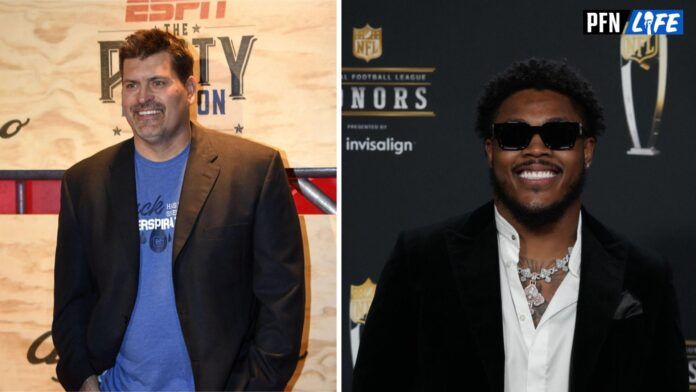The NFL’s running back market, and the lack of movement within it, has been a humungous talking point this offseason.
Tony Pollard, Saquon Barkley, and Josh Jacobs — three top performers a season ago — all got saddled with the franchise tag. Pollard, coming off an injury, accepted. Barkley, after a brief holdout, signed a comparable one-year deal. Jacobs continues to hold out, but most suspect he’ll report to camp eventually. After all, $10 million is better than no million.
Running backs across the league have vocalized their displeasure with the state of the market. And they have a point. Le’Veon Bell famously held out five years ago now for a franchise tag amount that was approximately $3 million richer, and that was after declining a five-year contract offer averaging $14 million annually, per Sports Illustrated.
Running backs are understandably disgruntled about a declining market, but one prominent former player recently spoke out about their complaints.
Mark Schlereth Speaks Out About Running Back Market
Long-time NFL guard and current outspoken analyst Mark Schlereth recently gave his thoughts on the state of the running back market during an appearance on The Rich Eisen Show.
“As far as the running backs having a stupid Zoom meeting and complaining and whining about it. It is what it is; that’s the market. And that’s how market economics work.
“So, quit complaining about it. I don’t remember any star running backs at the time standing up on their podiums, complaining about how unfair it is that the fullbacks were becoming extinct, as long as they were getting theirs.”
Schlereth’s argument isn’t without merit. Just a few short years ago, RBs got paid almost as exorbitantly as their skill-player counterparts. It was only after a few teams got burned by a couple of high-priced backs and their crunchy knees (i.e. Bell and Todd Gurley) that the market value for the position really began to dwindle.
“The one thing that has proven true over the years is that probably the easiest position in football to come out of college, transition to the NFL, and be great is the running back position,” Schlereth said.
“We’ve seen this on a consistent basis with guys that are drafted in the second, third, fourth round, becoming stars. It’s the nature of the position right now.
“And the running back position is just not one that [NFL teams] value as much because other guys can come in for a much cheaper price and have production. And then two, the injury issues … there’s a reason those guys don’t last long term.”
𝗧𝗥𝗘𝗡𝗗𝗜𝗡𝗚: Former NFL guard and current sportscaster Mark Schlereth says that the runningbacks need to “quit complaining and whining” about their lack of pay, via @awfulannouncing
Schlereth says that it’s just how the market is currently working in the NFL.
“As far as… pic.twitter.com/gxKEl1L56c
— JPAFootball (@jasrifootball) August 4, 2023
The durability issue Schlereth mentions is a valid concern. As mentioned, one-time top-end backs like Bell and Gurley wound up missing extended time or, in Gurley’s case, retiring young because of injury. Even now, some of the highest-paid backs in the league, like Barkley and Christian McCaffrey, have missed big chunks of time in their careers.
Sure, backs of that caliber are more impactful when available. But the risk of them missing time as they age always lurks. Most teams prefer to get 75 percent of the production for 25 percent of the cost and allocate those extra dollars elsewhere.
To hear Schlereth tell it, the only option running backs have in this NFL economy is to suck it up and play ball.
“It’s the market. Take the money that’s available to you. Go out there and play great,” he said. “You know, whatever. I don’t have any sympathy, empathy, any of the -athy’s. None of the -athy’s bother me. I don’t care.”

